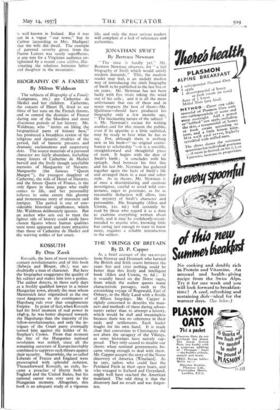Kossuth, the hero of most nineteenth- century revolutionaries and of
this book (Selwyn and Blount, as.), was un- doubtedly a man of character. But here the biographer exaggerates the quality of his subject and makes him into a genius. The author detects, in those early days as a freshly qualified lawyer in a minor Hungarian town, already the man whom Metternich later stigmatised as the one most dangerous to the continuance of Hapsburg rule over that conglomerate Empire. In point of fact,when Kossuth had his brief moment of real power in 1848-9, he was better disposed towards the Hapsburgs than the majority of his fellow-revolutionaries, and only the in- trigues of the Court party eventually turned him against the holder of St. Stephen's Crown. From that moment the fate of the Hungarian national revolution was settled, since all the remaining autocrats of Europe inevitably combined to suppress such threats against their security. Meanwhile, the so-called Liberals of France and England were preoccupied with splendid isolation. Thenceforward Kossuth, an exile, be- came a preacher of liberty both in England and the United States, but his national career was over save in the Hungarian memory. Altogether, this book is an adequate study of a vigorous life, and only the most serious readers will complain at a lack of references and authorities.














































 Previous page
Previous page